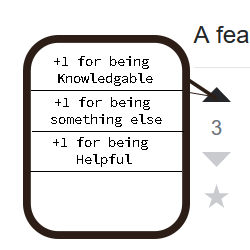I was reading several questions about commenting on down-votes so that the OP can know how to improve their question.
From the arguments against requiring a comment are:
- Commenting might produce arguments
- Arguments in the comments produce needless noise
- Downvotes are not for the OP, but for those who are seeking answers and don't want to waste time.
- Keeps Anonymity
- Takes too much time
- Solutions like Enable Optional Anonymous Reasons for Downvotes on Questions might be too noisy
Those are all valid arguments, and there are more arguments on other questions. However it would be a nice feature for the OP to get more detailed feedback as to what is wrong with their question, for those times when the OP really cares for an answer. So in order to have more feedback
I propose down-vote tags aimed specifically at the OP
How it would work: When you click the downvote button you have the additional option of holding down the mouse button and having a flying menu where you move your mouse over the options tags indicating a reason for the downvote, and release. Thereby selecting a preset reason for downvote.
Example of preset reasons
- Question is unclear
- Lack of Quality
- Lack of Research
- Missing perspective on subject
- False assertions
- Needs more info
- (Whatever is a common trend with questions that need a little help)
The hard part would be that these preset reasons should probably not coincide with a reason why the question should be close as this would essentially double the work of moderators. I think. It should only be in regards to reasons that are helpful for the OP to improve the questions.
You can also have the same fly out menu for the up-vote so that there is a reduction of comments which simply state +1 for acknowledging xyz in your question/answer
Here is a bad illustration of what it will probably never look like, but is just a mockup representation of the interaction. The graphic is currently only showing the positive options, they would be different according to context. But the general idea is that the options for a down-vote would be related to how the OP can improve his answer, and not a flag meant for those who come and look at the question as viewers, as that is what the down-vote is already for. It's a tool for the asker.
A sort of tag system would eliminate the need for the comments that resemble "+1 for xyz; -1 for xyc;" and general pleas for feedback on negative votes from both the comments of said questions as well as from the meta; all the while illuminating the OP as to how to improve their questions.
And these tags would also not be related to the existing tags system meant to categorize questions. It's completely different.
